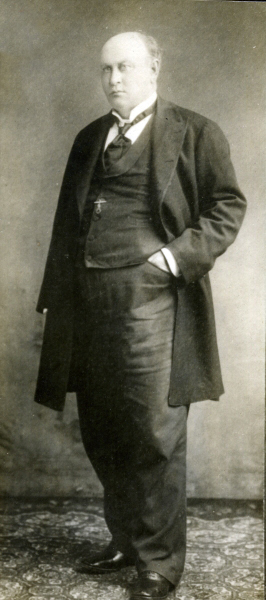
The Encyclopedia of Oklahoma History and Culture
CROCKER, SAMUEL (1845–1921).
Boomer and political activist and the third of six children of W. H. and Fannie Tyte Crocker, Samuel Crocker was born in Devonshire, England, on December 24, 1845. His family moved to Crockerville, Michigan, in 1846 and to Louissa County, Iowa, in 1854. In Iowa W. H. Crocker became a merchant, leaving operation of the family farm to his sons. Samuel received no formal education. Despite permanently disabling his left arm as a child, Crocker worked as a farm laborer, printer's devil, railroad agent, express agent, assistant postmaster, and merchant in his youth.
Samuel Crocker became a prominent speaker on monetary and labor issues in the early 1870s. He picked up the appellation "Iowa's Political Agitator" while campaigning for the Greenback-Labor Party in 1878. He participated in many of the third-party political conventions of the late nineteenth century. He proposed the woman's suffrage plank in the 1884 Antimonopoly Party platform. Crocker supplemented his speaking with the publication of several political tracts, namely The Triple Great Powers: The Power of Labor, the Power of Money, and the Power of Government (1882), The Political Separation of Capital and Labor (1883), and Our Next Republic (1884).
In addition to his Greenbacker activities, Samuel Crocker joined and promoted the Knights of Labor and the Farmers' Alliance in the 1880s. Crocker moved to Arkansas City, Kansas, to join David Payne's Oklahoma Colony in 1885. He became editor of the boomers' official newspaper, the Oklahoma War Chief, the same year. He argued that cattlemen illegally occupied central and western Oklahoma, with the collusion of federal authorities. He participated in the boomers' 1886 invasion of Oklahoma and in various pro-Oklahoma political conventions. Suspending the Oklahoma War Chief in 1886, he became editor of the Caldwell (Kansas) Industrial Age in 1887. Both papers promoted the Oklahoma movement and the Union Labor Party.
Crocker participated in the Washington lobbying that led to the opening of the Unassigned Lands to homestead settlement in 1889. As a member of William Couch's railroad grading team at Oklahoma City on April 22, 1889, he, along with other veteran boomers, stepped off the railroad right of way at noon to claim nearby sites. He filed on an eighty-acre homestead just north of town. His claim, however, was contested. In 1898 he sold his house to the contestant and abandoned the claim.
Oklahoma Populists nominated Crocker for delegate to Congress in 1890. Although weak from blood poisoning, he canvassed the territory in person. He received a disappointing 17 percent of the vote. While recuperating from the illness, he penned his last book, That Island (1892), a utopian novel describing the transition of an island nation from oppressive capitalism to populism.
Crocker represented the Populist Party on the legislative commission that conducted a territorial census and redistricted Oklahoma in 1892. While traveling with the commission, he founded Oklahoma's first Free Homes Club at Cloud Chief. He was instrumental in forming the coalition of Populists, Democrats, and renegade Republicans that organized Oklahoma's 1893 legislature. He remained active in the Populist Party until its demise after the 1900 election. His last political race was for the Oklahoma Legislature in 1912. He narrowly lost in the Democratic primary.
Samuel Crocker moved from his farm to Oklahoma City and entered the real estate business in 1892. He founded Mistletoe Mineral Springs on land south of Oklahoma City near the Canadian River in 1899 and opened the Pioneer Place Hotel in Oklahoma City in 1910. He never married. He died of natural causes in Oklahoma City on December 17, 1921.
See Also
CHARLES C. CARPENTER, OKLAHOMA CITY, DAVID LEWIS PAYNE, SETTLEMENT PATTERNS, UNASSIGNED LANDS






